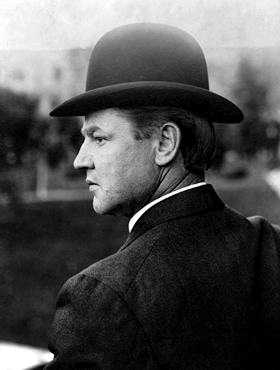On this date in 1869, William Dudley “Big Bill” Haywood was born in Salt Lake City, Utah Territory. In 1896, when working in an Idaho silver mine, Haywood joined the Western Federation of Miners and became active in the union. By 1900 he was already a member of the union’s General Executive Board. Haywood was an advocate for industrial unionism, uniting all workers in “one big union,” and was a founding member of the Industrial Workers of the World (Wobblies) in 1905.
Haywood advocated direct action and strikes and was involved in many strikes, where he used innovative tactics in order to attract the attention of the press. He had been involved with the Socialist Party of America but he and many IWW members wanted to focus on direct action and radical revolution instead of electoral politics and split from the Socialists in 1913. Haywood was also an advocate for racial unity in the labor movement, bringing black and white workers in segregated states into IWW-affiliated unions.
In 1917, Haywood and 164 other IWW members were charged under the Espionage Act of 1917 for “conspiring to hinder the draft, encourage desertion, and intimidate others in connection with labor disputes.” Judge Kenesaw Mountain Landis presided over the five-month trial. Haywood was convicted and sentenced to 20 years in prison but skipped bail and fled to the newly formed Soviet Union.
Haywood served as a labor adviser to Lenin’s government until 1923, when Stalin rose to power. He did not speak Russian, and his Russian wife did not speak English. He died in 1928 from complications of alcoholism, diabetes and a stroke. After his cremation, his ashes were split between the Kremlin Wall necropolis in Moscow and Chicago, where they were buried near the Haymarket Square Martyr’s Monument.

